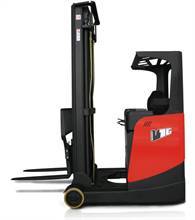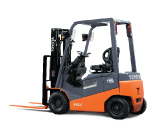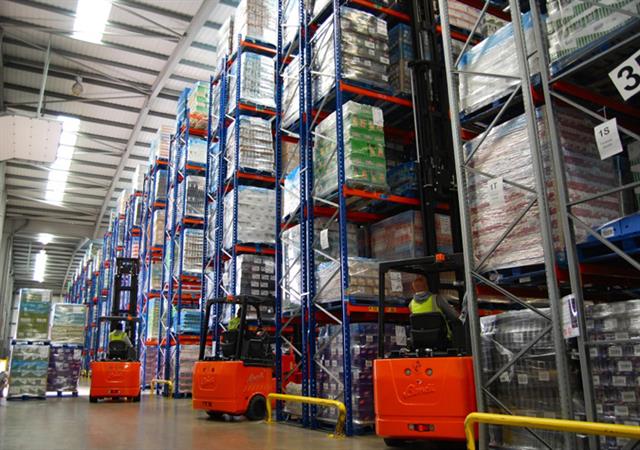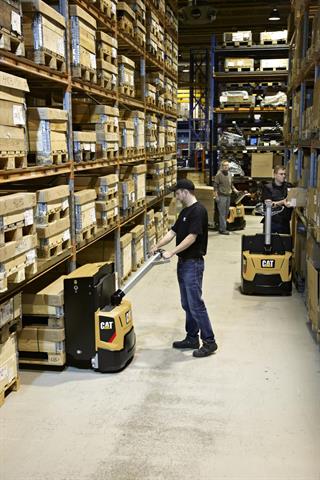 Image courtesy of 123RF and Flavijus Piliponis |
For many in the materials handling industry, 2012 felt like a trip to the dentist - necessary, boring and a little bit painful. The recession continued to bite into most countries and although there were signs of life within the industry, there was also the realisation that the economic challenges may be more than just a blip and may, in fact, represent the new "state of play".
Melissa Barnett looks back at 2012 and at what 2013 may bring.
China and Japan - backwards and forwardsAccording to the Construction and Equipment Industry in China Report published in October, China's materials handling sector has felt the pinch along with the rest of the world. The first quarter of 2012 saw a slowdown in both domestic and international demand, caused by the worldwide economic recession.
However, by the end of the year, total sales of forklifts were expected to be level with 2011 figures. Sales of IC forklifts continued to decline in 2012 by 7.6% but sales of electric forklifts, particularly electric ride-on forklifts, grew by 35.3% to 53,171 units.
 EP V series shown at CeMAT Asia 2012 |
Domestic demand for forklifts is expected to increase in 2013 with fierce competition from four major investors: large construction and automobile manufacturers searching out new investment areas, foreign-funded enterprises keen to expand marketshare, forklift manufacturers such as EP Equipment expanding existing product lines into the burgeoning electric forklift sector and lastly, established forklift manufacturers re-invigorating their core business in terms of technology, market and service.
Anhui Forkllift Truck Group and Zhejiang Hangcha continue to dominate the Chinese materials handling sector - accounting for nearly half of all China's forklift sales in 2012.
In his speech at this year's Industrial Truck Association's (ITA) Presidential Forum held in October, Lu Daming, president of the Beijing Materials Handling and Engineering and Research Institute, said that the following three to five years may be the most difficult time for economic development in China as the country adjusts to a transitional economy. In contrast to the Construction and Equipment Industry in China Report, Daming envisions a continued slowdown of forklift manufacturing in China in 2013 and beyond until fiscal policy becomes looser and urban development is restarted. He believes that the logistics industry in China, particularly in rural areas, is still developing and will continue to support the materials handling sector as logistics networks develop.
At the same forum, Japanese Industrial Vehicle Association (JIVA) president Toshihiko Uratsuji spoke about Japan's recovery after the Great Earthquake of East Japan in March 2011. Forklift production virtually stopped in the wake of the earthquake and sales plummeted. Since then, however, there has been gradual recovery and increased demand as reconstruction and equipment replacement began. This continued into 2012, only slowing down in June/July. JIVA expected a 5% increase in sales from 2011 figures.
In the first quarter of 2012, sales of internal combustion(IC) and electric counterbalance forklifts in Japan exceeded 12,000 units and electric walkers 5,000 units. Uratsuji believes that the future for forklifts lies in improving fuel efficiency, not only through technology but also by educating users. Supporting this view is market research group Freedonia's recently published World Material Handling Products study, which advises that electric forklifts should expect to see solid gains in 2013 as end-users seek to cut costs.
 Toyota counterbalance forklift |
Japan also provided the surprise merger of the year when Toyota Industry Corporation (TICO) announced a deal with Cascade Corporation of the USA in October. Cascade has been valued at USD759 million, despite the company's earnings dropping by 8.8% in the second quarter of 2012. The merger will mean an opportunity for Toyota to expand its product range and its sales areas. The two companies believe that the move will create a "global materials handling business", says Cascade president and CEO Robert.C.Warren Jr.
Europe and UK - it's a rollercoaster rideThe words on everyone's lips again this year were Euro crisis. The southern European countries of Spain, Portugal, Italy and Greece continue to suffer, with the European Materials Handling Federation (FEM) president Dr Klaus-Dieter Rosenbach telling the ITA Forum that there had been a 25% decline in forklift market volume in Italy and Spain in 2012.
According to KION group intelligence, European demand for new industrial forklifts fell to 237,000 units, 6.2% down on the first three quarters of 2011. In the first nine months of 2012, demand in western Europe declined 7.4 % year-on-year to 196,000 units, owing to the weakness of southern European economies. Demand in the eastern European market remained static in the first three quarters of 2012 at 41,000 units.
The Organisation for Economic Co-operation and Development (OECD) downgraded its more optimistic May forecast of the Euro-zone situation to expect a mild contraction of GDP of 0.1% in 2013 before growth picks up to 1.3% in 2014. However, all this is dependent on action by the central banks and co-operation on fiscal policy.
Other countries in the EU are on the upside of the rollercoaster ride. In Germany and non-EU Britain, forklift sales are almost back to 2007 levels. A number of materials handling companies in Germany, the UK, Ireland and the Netherlands have told Forkliftaction News that order books have been good this year and are full going into 2013. FEM believes that good sales in some European areas have been largely supported by stock replacement rather than by new sales, a trend which started in 2011.
 Bendi's at work at Symingtons the UK's largest convenience foods business. |
Linde CEO Theodore Maurer believes his company's decision to offer rental fleet options and financing has helped maintain a positive ledger in 2012. Simon Brown, managing director of Bendi, has also developed the rental side of his business but adds that service and an ability to supply parts have played a crucial role in keeping Bendi in the black. Brown is concerned over rising costs across the materials handling manufacturing supplier base and the plea from customers for prices to remain static. He believes that these will be serious challenges in 2013 and will mean companies will have to "resolve the issue by achieving more productivity out of costs".
FEM's Rosenbach also predicted that the positive trend in eastern European markets would continue into 2013, with Russia as the main driver. Egon Strehl, managing director of Clark Europe GmbH, says Clark will be focusing on the needs of these emerging markets over the coming year. Strehl explains, "These markets differ significantly in their materials handling needs to countries in western Europe. The market demands simple, robust technology and a good price point ratio. In addition, there is a growing demand for on-site service, training and spare parts."
Mitsubishi Caterpillar Forklift Europe (MCFE) used the current trend to electric forklifts to restructure its Dutch and Finnish operations in 2012. Vice-president of marketing and sales Bengt Carlioth sees 2013 as a year of changes for MCFE: "We are creating a centre for electric forklift development at our Finnish operation. The trend is clear - electric is becoming a mature product with more or less the same features and benefits globally," he explains. "As well as our main R&D centre in Finland, we will continue our efforts in the year to come at our facilities in Japan, the US and Asia."
USA - looking up the slopeGeorge W Prest, president of the Materials Handling Industry of America (MHIA), tells
Forkliftaction.com News that his organisation is optimistic about the coming year. This view is supported by the Manufacturers Alliance for Productivity and Innovation's (MAPI) quarterly economic forecast released in November which presents a slightly rosier forecast than the one they released in August. US GDP is expected to grow by 1.8% in 2013 and by 2.8% in 2014. Final figures for GDP growth in 2012 could be 2.1% and manufacturing production 4.2%.
It is recognised that much of the forecast depends on the political response to the fiscal cliff. As Daniel J Meckstroth, MAPI chief economist, explains, "In order for the transition to moderate growth to occur successfully, there needs to be compromise on the 'fiscal cliff' issue; agreement on raising the debt ceiling early in 2013, and establishing a 'grand compromise' plan for meaningful long-term federal deficit reduction that phases in over several years."
In the meantime, MHIA had forecast a growth of 8-9% for materials handling equipment in 2012 and 6% in 2013 to 153,500 units, up 1% on 2012 sales, with continued but modest growth in 2014. Prest says, "while conservative, this forecast would still result in a healthy position for the forklift industry and would be the ninth-highest volume year in their history." However, MHIA's long-time economist, Hal Vandiver, had an eye on Europe and China when he warned in
Modern Materials Handling that "events in the export market aren't good for us".
NACCO Industries' materials handling arm, Hyster-Yale Materials Handling Incorporated, released its third quarter results in November 2012, showing higher profits and lower sales. Hyster-Yale says the lower sales stemmed primarily from "unfavourable foreign currency movements mainly caused by a weakening of the Euro and Brazilian Real against the US Dollar and a decline in unit volume, primarily in Europe and the Americas. The favourable effect of unit price increases implemented in 2011 and early 2012, primarily in Europe and the Americas, partially offset the decrease in revenue."
Going into 2013, Hyster-Yale expects global volumes to be slightly down on the previous year, but expects 2013 to see an overall increase in shipments and parts volumes in all markets, with the majority of this increase driven by the Americas. These sentiments are echoed by Prest, who believes that trends such as re-shoring manufacturing back to the US, the Panama Canal expansion and increased US exports are positive signs for the forklift industry and the US economy in general.
2013There are continued concerns regarding forklift safety which are too often highlighted in
Forkliftaction.com News stories and columns - and 2012 was no exception. The British Industrial Truck Association (BITA) points out that funding for the Health and Safety Executive (HSE), the UK's independent watchdog for work-related health, illness and safety, has been cut by 13% since 2009. No doubt, other countries' health and safety bodies are experiencing similar funding strictures.
 CAT NPP16-20N2 pedestrian power pallet mover. Finalist in FLTA's 2013 Awards for Excellence - Ergonomics section. |
And finally for 2013, the "global economy recovery still lacks energy, the economy grows at low speed", says Lu Daming. Linde's Maurer adds "the global industrial truck market is likely to fare slightly less impressively in 2012 as a whole than it did in 2011." However, he forecasts a moderately successful 2013, "With the change of regime in China, the re-election in the USA and a gradual stabilisation in the Euro crisis, we can once again start the new year within a positive climate - so long as no severe economic events have an adverse impact on the industrial truck market - I am optimistic."
Don't forget * Jan 16th - last day for voting in The FLTA Awards for Excellence 2013. Categories include environment, ergonomics, safety and innovation.
* The exciting Fleet and Asset Management feature in
Forkliftaction.com News will be published in March, 2013. If you would like to participate, please contact
www.forkliftaction.com